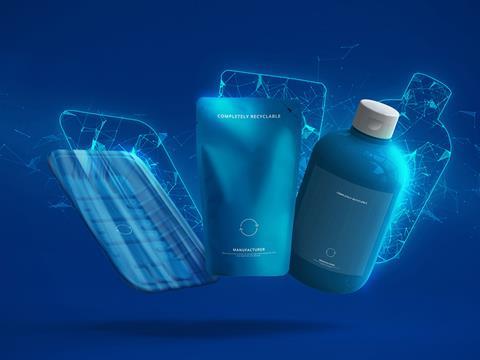
In this article, part of our ongoing series of interviews with the finalists of the Sustainability Awards 2022, we talk with R-Cycle about its digital product passport, through which it aims to revolutionise traceability in plastic recycling.
You’re a finalist in the Sustainability Awards 2022. Congratulations! To start off, could you summarise your entry in fewer than 50 words?
R-Cycle is the digital product passport for sustainable plastic packaging. As a platform for all stakeholders along the packaging lifecycle it automatically collects and provides recycling-relevant data in an open standard format during packaging production and makes it accessible for improved waste sorting and further applications to improve sustainability.
Why do you think the judges were impressed with your entry? Tell us about what is innovative about your project and/or about its impact on packaging sustainability.
The compelling added value of R-Cycle is that it addresses the main problem of today’s plastics recycling. The current problem exists because of the missing information about the use (e.g. food/non-food), type of plastic or certain additives etc. within the waste sorting process. R-Cycle provides this information.
If you look at present-day waste streams, even fully recyclable packaging cannot be separated precisely enough to achieve high-quality recycling. With R-Cycle, production machinery automatically records all recycling-related properties in a digital product passport, passes this along the value chain, and makes it retrievable via an appropriate marker (e.g. digital watermark or QR code) on the packaging.
Data is acquired where it is already available - this can be done through connecting production lines or ERP systems. Thus, waste-sorting facilities can identify recyclable packaging and form recycling-friendly and pure fractions. This is the basis for obtaining high-quality recyclates to establish a working circular economy.
How has your innovation/initiative been received thus far?
R-Cycle has been developed to market maturity by a number of technology companies and organizations from across the lifecycle of plastic packaging and has already reached an important milestone regarding standardization. GS1 – the leading global network for cross-industry process development – launched a project for creating an industry guideline based on R-Cycle.
The so-called PDS4CircularPlastics project (Processes and data sharing approach for enabling circular plastics value networks) was launched by GS1 Germany in January 2022 and is expected to be completed this year. The R-Cycle Community currently counts over 20 leading companies from the packaging industry.
In addition, a large number of pilot projects with different partners, different focuses and applications respectively, have proved its effectiveness. As a working solution from the industry, R-Cycle aggregates the relevant know-how along the complete value chain. By using open and global standards, (GS1) it is accessible for all participants – non-discriminatory and inter-operable.
You’re shortlisted for the Driving the Circular Economy category. What do you see as the key demands, challenges and opportunities in relation to driving the circular economy in packaging?
To drive the circular economy, two key enablers are essential: fully recyclable packaging and highly sophisticated recycling processes. The first prerequisite already exists in the form of numerous recyclable packaging solutions, such as mono-material composites, in addition to recycling-friendly inks, glues, and additives.
The second enabler is the precise sorting and high-quality recycling or upcycling of plastic packaging. The application of digital product passports for data-based production and recycling processes holds enormous potential, which we want to unleash with R-Cycle.
The winners of this Sustainability Awards category will be announced at a dinner taking place at the Sustainable Packaging Summit in Lisbon on 13th-14th September 2022. To attend the ceremony, register here.














No comments yet